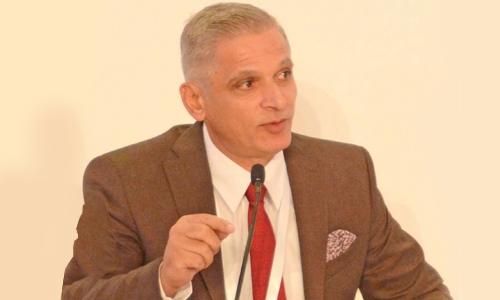Equality of men and women guaranteed in Bahrain Constitution: SCW
Manama : The Kingdom’s Constitution guarantees the right of all citizens to human dignity and public rights and duties without distinction to race, origin, language or religion, Dr. Mohamed Al Masri, Legal Advisor of General Secretariat of the Supreme Council (SCW) has said.
He was making a presentation at the Arab Conference on “Good Practices and Regional Opportunities for the Promotion of Women’s Rights and Equal Access to Nationality”, which was organised by the League of Arab States at the League of Arab States premises in Cairo from October from 1-2.
Highlighting the achievements of the Kingdom of Bahrain in the fields of gender equality, he said: “Women share equality with men in economic, social and political rights guaranteed by the Constitution and regulated by national legislation and international conventions and treaties ratified by the Kingdom of Bahrain”.
He explained to the audience, “With regards to the Bahraini Nationality Law, the Bahraini legislator has ensured equality between men and women in terms of their right to acquire, retain, renounce and lose citizenship. Women acquire citizenship by the same standards and conditions as men. The marriage of a non-Bahraini man by a Bahraini woman or changing the nationality of the husband during marriage does not entail changing the nationality of the wife, losing her nationality, or imposing the nationality of the husband unless she decides to enter the husband’s nationality. She may even regain her nationality if the marriage ends and she wishes to do so and was a resident of Bahrain or has returned to live there.”
The official explained further, “The Bahraini Nationality Law also grants citizenship to the children of Bahraini women in specific cases to avoid cases of entering into statelessness, which shows beyond any doubt that Bahraini law is not based on any discriminatory provisions against women but on considerations and restrictions based on nationality legislation, in accordance with principles agreed upon in international law, which can be summarised by considerations of preserving the sovereignty of the state and considerations based on the prevention of statelessness, where every person has the right to have a nationality, that’s in addition to considerations that prevent and combat the phenomenon of dual nationality.”
Referring to the nationwide campaign demanding to grant Bahraini women married to foreign men the right to pass their Bahraini citizenship to their children, Dr. Al Masri commented, “The proposal to amend the Nationality Law, which is currently being discussed before the legislature, to allow the children of Bahraini women married to foreign nationals to obtain Bahraini citizenship in accordance with regulations that respect the Constitution, safeguard the sovereignty of the State and respect the requirements of the principles and foundations on which the legislation governing nationality is established. The State and the individual are committed by the State to guarantee the rights of the individual, and in return the individual owes them allegiance and belonging.”
During the presentation, a number of measures were highlighted that benefit the children of Bahraini women married to non-Bahraini men up until the legislation is amended.
Such measures include receiving applications for citizenship for the children of Bahraini women married to non-Bahraini nationals by the SCW, whereby such applications are reviewed by a joint committee formed by the Council, the Royal Court and the Interior Ministry, which is responsible for nationality, passports and residence affairs.
“Over the past ten years, around 4, 000 sons and daughters have been granted the Bahraini nationality by Royal Orders issued by the King. Other measures include, facilitating the granting of the children of Bahraini women married to non-Bahrainis a visa to the Kingdom of Bahrain, granting non-resident children a longer stay when they wish to visit the Kingdom, and facilitating the issuance of a travel document for a specific period for children in special cases such as traveling abroad for study or treatment,” Dr. Al Masri said.
Elaborating further, the official stated, “Granting the children of Bahraini women married to non-Bahraini nationals equal treatment to the children of Bahrain men when benefiting from certain services such as health, education and residency fees is guaranteed. The Bahraini law also stipulates that children with disabilities of Bahraini women married to a non-Bahraini who reside permanently in the Kingdom shall be treated in the same manner as Bahrainis with disabilities. That includes allowing them to take advantage of the services and privileges stipulated by this law.”
He highlighted in his speech other measures taken by several official authorities in the Kingdom to ensure equality of treatment of children of Bahraini fathers married to foreigners and Bahraini women married to non-Bahraini men, in terms of the rights of free education, employment and other services.
The conference was held in cooperation with the United Nations High Commissioner for Refugees, the United Nations Children’s Fund, the UN Women and the World Campaign for Equal Rights of Citizenship, with the participation of a number of regional and international organisations, civil society organisations, international experts and diplomatic representatives from Member States.
Related Posts

